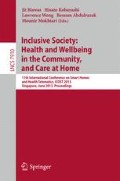Abstract
A removable support bar without structural modification of the environment, was developed. Assistive technology (AT) is a multidisciplinary science that combines knowledge of health professionals and the exact sciences area. This study is based in the methods of engineering product design and its relation to the development of resources. This paper aims to present the development process of a removable support bar that is easy to use, requiring no technical knowledge and no change the constitution of the walls and floors in the houses. Based on the methodology design the study was divided into five stages: informational (questionnaire with closed questions and an essay from the target population for use of the bar); conceptual (technical specifications, design, standards, solutions and decisions); preliminary design (design and drawing fully bar, and prototype (project preparation and design of the bar, prototyping and evaluation), validation (validation of the prototype). As the results, the support bar have been developed with seven parts for assembly in several configurations that can attend the populations needs in terms of available room: the parts are: base, tube, tee, elbow, elbow 30o.; elbow 60o. and elbow-tee. Volunteer’s priority are to employ it in the bathrooms and bedrooms. The attachment configuration has small height (0,90 m) and is glued with thermo wax resin that is easy to assemble, and fixation, is removable causing no damage to the floor surface and is secure.
Access this chapter
Tax calculation will be finalised at checkout
Purchases are for personal use only
Preview
Unable to display preview. Download preview PDF.
References
Pahl, G., Beitz, W., Feldhusen, J., Grote, K.: Ministério da Saúde. Disponível, http://www.planalto.gov.br/ (Accessed in March 10, 2012)
Pahl, G., Beitz, W., Feldhusen, J., Grote, K.: Projeto na Engenharia. São Paulo: Edgar Blücher (2005)
Soares, M.M., Martins, L.B.: Design universal e ergonomia: uma parceria que garante acessibilidade para todos. In: Almeida, A.T., Souza, F.M.C. (eds.) Produção e competitividade: aplicações e inovações, pp. 127–156. Universitária da UFPE, Recife (2000)
Author information
Authors and Affiliations
Editor information
Editors and Affiliations
Rights and permissions
Copyright information
© 2013 Springer-Verlag Berlin Heidelberg
About this paper
Cite this paper
Assad, D.A.B., Elui, V.M.C., Fortulan, C.A. (2013). The Development of a Support Bar without Structural Modification of the Domestic Environment. In: Biswas, J., Kobayashi, H., Wong, L., Abdulrazak, B., Mokhtari, M. (eds) Inclusive Society: Health and Wellbeing in the Community, and Care at Home. ICOST 2013. Lecture Notes in Computer Science, vol 7910. Springer, Berlin, Heidelberg. https://doi.org/10.1007/978-3-642-39470-6_42
Download citation
DOI: https://doi.org/10.1007/978-3-642-39470-6_42
Publisher Name: Springer, Berlin, Heidelberg
Print ISBN: 978-3-642-39469-0
Online ISBN: 978-3-642-39470-6
eBook Packages: Computer ScienceComputer Science (R0)

